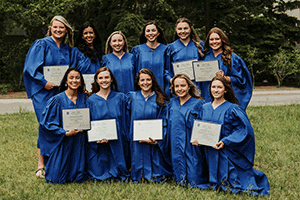Ready to learn more?
Get all the details straight to your inbox!

Luther College is a great choice for high school to university transition. Enjoy all the benefits of a larger campus, without feeling lost in the crowd. Our community is full of caring mentors and peers to ensure a positive student experience.

Living in The Student Village at Luther College, our student residence, comes with a choice of healthy, nutritious meal plans. That means no grocery shopping, no meals to cook, and no dirty dishes to worry about. You can focus on your studies and wellness!

Luther College students are eligible for nearly $100,000 in academic awards – in addition to scholarships and bursaries awarded by the U of R.

Luther College students are U of R students and receive all the same benefits. Upon graduation you will receive a U of R degree.

You can book a tour of Luther College, the U of R campus, and our student residence, The Student Village at Luther College, any time throughout the year. Contact our Recruitment Office at 1-306-206-2117.

Free enrolment counselling support and invaluable one-on-one academic advising are available for all programs at Luther College.

Our student residence, The Student Village at Luther College, welcomes residents from ALL post-secondary institutions in Regina. Rooms come with a meal plan, free laundry, free wi-fi, and a great sense of community.

Smaller class sizes at Luther College means more individualized attention and better connections with your professors, classmates, and academic advisors.
Get all the details straight to your inbox!
Original research, required of all master's and doctoral candidates.
An introductory class in the theory and techniques of differentiation and integration of algebraic and trigonometric functions. Topics include limits, optimization, curve sketching, and areas. ***Prerequisite: Precalculus 30 with at least 75%, or Calculus 30 or Mathematics B30 and C30 with a grade of at least 65% in each or Math 102*** *Note: Students can receive credit for only one of MATH 103 or 110*
Lab
Online delivered course. The course emphasizes theoretical and practical considerations in the governance of nonprofit organizations. It focuses on what boards, the volunteers who serve on them do, and how they do it to maximize nonprofit governance and organizational effectiveness. Emphasis on competencies of highly effective boards, CEOs, board chairs, and leadership volunteers. ***Prerequisite: NSLI 100, or 12 credit hours, or permission of the Department.*** *Note: NSLI 100 may be taken concurrently.* *Note: Formerly numbered NSLI 360. Students may receive credit for only one of NSLI 360 or NSLI 260.*
Thesis Research
This course is an introduction to forensic psychology. It focuses on how psychology can be used to understand the behavior of those involved in the justice system. It includes topics such as psychology of police investigations, deception, eyewitness testimony, child victims and witnesses, juries, mental illness in court, sexual offenders, psychopathy, and risk assessment. In this class, you will gain experiencing connecting psychology research with real criminal cases in Canada.
A survey of theory and research related to individual differences in thinking, feeling, and behaving. ***Prerequisite: PSYC 101 and PSYC 102.***
Thesis Research
An introduction to the academic study of religion; a survey of the thought and practices of major world religions; the impact of religion on society and culture.
For Engl/Science students only. Must also register in ENGL 100 L01 & CHEM 104-003. An examination of biological molecules, cell structure and fundamental cellular processes, bioenergetics, genetics, evolution, and animal and plant physiology. *Notes: Biology 30 and Chemistry 30 are strongly recommended as background preparation. This course is designed for biology majors, pre-professional students, secondary education science students, and those wanting two semesters of biology. Students seeking a single semester introductory course are advised to take Biology 140 or 150*
Lab. For Engl/Science students.
Hyflex- online/onsite flexible Instructional Method. An introductory level course covering the principles of biology with examples taken from humans. * Note: This course is designed to apply the study of biological principles to humans. Biology majors cannot take this course for credit. Students cannot receive credit for both BIOL 140 and 150. Students who have credit for either BIOL 100 or BIOL 101 cannot subsequently receive credit for either of BIOL 140 or BIOL 150. *
Lab
Lab
Lab
Hyflex- online/onsite flexible Instructional Method. This course is a survey of basic modern biological principles. Topics will include: origin of life, basic cell structure and function, evolution, an outline of organism diversity, ecological principles, and selected functions of multicellular organisms. *Note: Designed for students who do not intend to be biology majors and who are not in pre-professional programs. Students cannot receive credit for both BIOL 140 and 150. Students who have credit for BIOL 100 or BIOL 101 cannot subsequently receive credit for either of BIOL 140 or BIOL 150.*
Lab
Lab
Research
Hyflex- online/onsite flexible Instructional Method. Luther students only until 11:00AM on April 27th. For ENGL/SCI students only. Must also register in BIOL 100-L01 & CHEM 104-003. This course develops students' proficiency in critical reading and writing through the study of a wide range of non-literary and literary texts, and the study of composition, with emphasis on connections between modes of reading and writing. *Note: Students who are planning to repeat ENGL 100 should seek academic advising before doing so*
Hyflex- online/onsite flexible Instructional Method. CRIME/JUSTICE Students only. Must also register in PSYC 101-L02. This course develops students' proficiency in critical reading and writing through the study of a wide range of non-literary and literary texts, and the study of composition, with emphasis on connections between modes of reading and writing. *Note: Students who are planning to repeat ENGL 100 should seek academic advising before doing so*
This course develops students' proficiency in critical reading and writing through the study of a wide range of non-literary and literary texts, and the study of composition, with emphasis on connections between modes of reading and writing. *Note: Students who are planning to repeat ENGL 100 should seek academic advising before doing so*
This course develops students' proficiency in critical reading and writing through the study of a wide range of non-literary and literary texts, and the study of composition, with emphasis on connections between modes of reading and writing. *Note: Students who are planning to repeat ENGL 100 should seek academic advising before doing so*
This course develops students' proficiency in critical reading and writing through the study of a wide range of non-literary and literary texts, and the study of composition, with emphasis on connections between modes of reading and writing. *Note: Students who are planning to repeat ENGL 100 should seek academic advising before doing so*
Remote - synchronous Instructional Method. This course develops students' proficiency in critical reading and writing through the study of a wide range of non-literary and literary texts, and the study of composition, with emphasis on connections between modes of reading and writing. *Note: Students who are planning to repeat ENGL 100 should seek academic advising before doing so*
A study of a special topic in literature, which may include non-literary texts, in conjunction with a continuation of the writing program begun in ENGL 100. ***Prerequisite: ENGL 100.*** *Note: Every section of ENGL 110 has a different focus. Please consult the Department's Supplementary Calendar or the list of current course offerings on the Departmental website.* *Note: Students who fail ENGL 110 twice should contact their faculty or their federated college immediately.*
This course will combine detailed study of selected poetry and prose of William Blake with a study of various critical approaches to that work. It will look at Blake in the context of poststructuralism, contemporary textual theory, and new historicism. ***Prerequisite: ENGL 100 and either ENGL 110 or completion of 48 credit hours.***
An introduction to the human and natural environments from a geographical perspective. The fundamental themes, of human and physical geography are examined by focusing upon global issues and regional patterns. *Note: Students may receive credit for only one of GES 100 and GEOG 100.*
The so-called "Third World" is examined from a spatial perspective. Topics of investigation include imperialism, population growth, political boundaries, and economic transition. ***Prerequisite: 30 credit hours including one of GES 100 or GES 120, or permission of the Department Head.*** *Note: Students may receive credit for only one of GES 316 and GEOG 316.*
This course explores the influence of the past on the world in which we live. Topics addressed will be taken from today’s headlines and will reflect a wide variety of periods and geographical areas. Topics may include terrorism, environmentalism, war, demonstrations, popular culture, the welfare state, global crises.
Online delivered course. This course examines the Italian Renaissance in art, culture and thought; overseas explorations; Protestant and Catholic Reformations; rise of the nation state; the Thirty Years War; the Scientific Revolution. *** Prerequisite: One 100 level HIST or completion of 15 credit hours ***
This course will examine historical incidents as a way of exploring creative interactions of Western culture with other cultures. The course will emphasize the positive aspects of diversity and pluralism. The inquiry will be organized so that students are able to use multiple perspectives, and develop critical, discerning thought.
Differentiation of algebraic, exponential, and logarithmic functions. Optimization, curve sketching, and integration by substitution. ***Prerequisite: Precalculus 30 or Mathematics B30 with a grade of at least 65% or AMTH 092 with a grade of at least 80%, or Math 102*** *Note: Although Math 103 leads to Math 112, students who require three or more calculus-based courses should take Math 110 instead of Math 103. Students will only receive credit for one of MATH 103 or 110*
Lab
An introductory class in the theory and techniques of differentiation and integration of algebraic and trigonometric functions. Topics include limits, optimization, curve sketching, and areas. ***Prerequisite: Precalculus 30 with at least 75%, or Calculus 30 or Mathematics B30 and C30 with a grade of at least 65% in each or Math 102*** *Note: Students can receive credit for only one of MATH 103 or 110* Labs will start from the second week.
ENGL/SCI students only. An introductory class in the theory and techniques of differentiation and integration of algebraic and trigonometric functions. Topics include limits, optimization, curve sketching, and areas. ***Prerequisite: Precalculus 30 with at least 75%, or Calculus 30 or Mathematics B30 and C30 with a grade of at least 65% in each or Math 102*** *Note: Students can receive credit for only one of MATH 103 or 110* Labs will start from the second week.
Lab
Lab
A course intended to introduce students to elementary linear algebra, particularly at a computational and applied level. Topics include matrices and systems of equations, inversion, determinants, vectors, inner products, eigenvectors and eigenvalues. ***Prerequisite: Precalculus 30, Mathematics B30 and C30, or Math 102.***
Ordinary differential equations, modelling with differential equations, Laplace transforms. ***Prerequisite: MATH 111 and MATH 122***
Series solutions of linear equations, systems of linear first-order equations, Fourier series, boundary-value problems, integral transforms, and numerical methods. ***Prerequisite: MATH 217.***
What would life be without music? This broad survey course explores the changing role of music within society across time and disciplines, with emphasis on developing critical listening skills. * Note: Not available for credit in BMus or BMusEd programs.*
This course traces the development of important musical styles, genres and forms from the second half of the 18th century to the late 20th century by placing representative composers and selected musical works into their appropriate socio-cultural and historical contexts. Emphasis is on developing basic listening, writing and research skills. ***Prerequisite: Music reading ability*** *Note: Students cannot receive credit for both MU 202 and MUHI 202.
Online delivered course. An introduction to the nonprofit and voluntary sector in Canada and the organizations that comprise it. The course examines the history, size, scope, and roles of the sector in society, relationships with government and other sectors and accountability in the context of governing and managing a private not-for-profit corporation. *Note: Students may receive credit for one of NSLI 100, IDS 290AA or NSLI 200.*
Communications with the general public, governments, other nonprofits, businesses, media, funders and donors in order to build intentional relationships are explored. Theory and practice are integrated in examining relationships and accountabilities. New perspectives on social media, virtual/public presence, branding, key messages, and time-sensitive response mechanisms are discussed. ***Prerequisite: NSLI 100 or 12 credit hours, or permission of the Program Director.*** *Note: NSLI 100 may be taken concurrently.* *Note: Students may receive credit for one of NSLI 230 or NSLI 330.*
The NSLI Internship consists of a 13-week part-time placement at a host organization partner, in which the student intern performs work on designated projects. ** Permission from the NVSSN Director is required to register. Email colleen.strauch@uregina.ca for information on how to register.
Remote - synchronous Instructional Method. Effective program planning and evaluation based on understanding the shifting external environment in which staff and volunteers operate, as well as their internal environment. Includes mixed methods research; external environment trend analyses and projections; internal organization database management and analytic strategies; program evaluation and decision-making models; and special projects management. ***Prerequisite: NSLI 100 or 12 credit hours, or permission of the Program Director.*** *Note: NSLI 100 may be taken concurrently.*
This introduction to philosophy will explore how philosophy can provide answers to some of the more profound questions we face, such as questions concerning knowledge, truth, mind and body, personal identity, free will, morality, politics, reasoning and the existence of God. * Note: Topics will vary with sections of this course *
An introduction to the systematic study of reasoning, this course will teach the theory and practice of good reasoning. It will provide students with reasoning skills that are useful in whichever discipline and career they may pursue.
Hyflex- online/onsite flexible Instructional Method. An analysis of religious claims concerning the existence of God, religious experience, faith, revelation, and immortality. Modern and contemporary works will receive major attention. *** Prerequisite: PHIL 100 or completion of 15 credit hours ***
An examination of the meaning and significance of the concept of sustainable livelihoods through diverse philosophical lenses and as a strategy in advancing sustainable development. Its relation to other sustainability terms (e.g. sustainable lifestyles, sustainable consumption and production) and philosophical concepts (e.g. autonomy, agency) will also be explored. **Permission of the Department Head is required to register.** *Note: Students may receive credit for one of PHIL 880AK or PHIL 870AJ.*
This introduction to philosophy will explore how philosophy can provide answers to some of the more profound questions we face, such as questions concerning knowledge, truth, mind and body, personal identity, free will, morality, politics, reasoning and the existence of God. * Note: Topics will vary with sections of this course *
This section is restricted to PPE, PHIL, ECON, and PSCI majors. Please contact your faculty for help with registration. An introduction to the systematic study of reasoning, this course will teach the theory and practice of good reasoning. It will provide students with reasoning skills that are useful in whichever discipline and career they may pursue.
Hyflex- online/onsite flexible Instructional Method. An introduction to the study of adjustment, disorders, development, personality and the social environment of the person.
Hyflex- online/onsite flexible Instructional Method. An introduction to the study of brain and behaviour, perception, learning, memory, cognition, motivation and emotion.
An introduction to biological, cognitive, and social aspects of psychological development across the lifespan. ***Prerequisite: PSYC 101 and PSYC 102.***
An examination of the major theories, research methodologies, and data in the field of the psychology of women. Philosophical values of feminism and the psychological impact of women's historical roles in society, and cultural perspectives pertaining to women will be considered throughout. ***Prerequisite: PSYC 101, PSYC 102, and two 200 level courses in the social sciences, or permission of the Department Head.*** *Note: This course will initially be restricted to PSYC majors. Non-majors will be eligible to register at a later point if space remains.*
This course examines theory and research on social and emotional development from birth through adolescence and the relative influence of various contextual factors, such as peers, out-of-home care, and media. Implications for problematic outcomes in families, daycares, and schools, and for prevention and intervention practices, will be discussed. ***Prerequisite: PSYC 210 and completion of 60 credit hours.*** *Note: This course will initially be restricted to PSYC majors. Non-majors will be eligible to register at a later point if space remains.*
Thesis research.
Thesis research.
Crime/Justice Bundle students only. Hyflex- online/onsite flexible Instructional Method. An introduction to the study of brain and behaviour, perception, learning, memory, cognition, motivation and emotion.
Hyflex- online/onsite flexible Instructional Method. An introduction to the academic study of religion; a survey of the thought and practices of major world religions; the impact of religion on society and culture.
Hyflex- online/onsite flexible Instructional Method. An introduction to reading the Qur'an, the Muslim holy book, in English translation; exploration of the Qur'an's main themes, literary structures, origins, and varieties of interpretation. No prior knowledge of the Qur'an or of Islam is required. ***Prerequisites: Completion of 12 credit hours or RLST 100.***
Remote - synchronous Instructional Method. This course will examine the diverse experiences of Muslim women, with specific reference to scripture, historical contexts and selected contemporary concerns. Emphasis will be placed on the debates between traditionalists and modernists and liberals, fundamentalists and feminists. ***Prerequisites: Completion of 24 credit hours or a 200 level RLST course.***
An introduction to statistical methods; descriptive statistics; the normal distribution; basic techniques of statistical inference; confidence intervals and hypothesis tests for population means and proportions; simple linear regression; and one-way analysis of variance. ***Prerequisite: Foundations of Math 20 or Precalculus 20 or Apprenticeship & Workplace Math 30 or MATH A30 or AMTH 091 or MATH 101*** *Note: STAT 100 and STAT 200 are designed to provide a year-long introduction to statistical methodology with a view towards applications and are not intended for majors in statistics, actuarial science, or any other program requiring a detailed knowledge of statistics. Students who receive credit for STAT 100 may not receive credit for STAT 160*
A continuation of STAT 100; inference for two categorical variables; basic multiple linear regression; two-way analysis of variance; introduction to nonparametric methods; statistical process control; introduction to survey design. ***Prerequisite: STAT 100*** *Note: STAT 100 and STAT 200 are designed to provide a year-long introduction to statistical methodology with a view towards applications and are not intended for majors in statistics, actuarial science, or any other program requiring a detailed knowledge of statistics. Students who receive credit for STAT 200 may not receive credit for STAT 160*
Remote - synchronous Instructional Method. This course will examine the historical development of feminism and women's studies. Women's representation in academic practice will be analyzed using examples from humanities, the arts, and social sciences. Strategies for change and for the empowerment of women will be considered.
Hyflex- online/onsite flexible Instructional Method. An introductory level course covering the principles of biology with examples taken from humans. * Note: This course is designed to apply the study of biological principles to humans. Biology majors cannot take this course for credit. Students cannot receive credit for both BIOL 140 and 150. Students who have credit for either BIOL 100 or BIOL 101 cannot subsequently receive credit for either of BIOL 140 or BIOL 150. *
Lab
Lab
Lab
This course and lab L07 are taught in French. An introductory level course covering the principles of biology with examples taken from humans. * Note: This course is designed to apply the study of biological principles to humans. Biology majors cannot take this course for credit. Students cannot receive credit for both BIOL 140 and 150. Students who have credit for either BIOL 100 or BIOL 101 cannot subsequently receive credit for either of BIOL 140 or BIOL 150. *
Lab (taught in French).
Online delivered course. An introductory level course covering the principles of biology with examples taken from humans. * Note: This course is designed to apply the study of biological principles to humans. Biology majors cannot take this course for credit. Students cannot receive credit for both BIOL 140 and 150. Students who have credit for either BIOL 100 or BIOL 101 cannot subsequently receive credit for either of BIOL 140 or BIOL 150. *
Online delivered lab.
The intent of this course is to provide a basic introduction to pathogens and the concept of diseases. This course covers bacteria, viruses and eukaryotes, with emphasis on emergent diseases and urgent challenges for public health. ***Prerequisite: BIOL 100 and BIOL 101*** *Note: Students who have received credit for BIOL 303 may not subsequently receive credit for BIOL 224.*
Lab
Lab
Lab
Lab
Research.
Aetiology, pathogenesis, diagnosis, treatment and epidemiology of infectious diseases of humans, caused by bacterial, viral, fungal and parasitic organisms. ***Prerequisites: BIOL 224 and 288***
This course develops students' proficiency in critical reading and writing through the study of a wide range of non-literary and literary texts, and the study of composition, with emphasis on connections between modes of reading and writing. *Note: Students who are planning to repeat ENGL 100 should seek academic advising before doing so*
Restricted to English/Science Bundle. Hyflex- online/onsite flexible Instructional Method. A study of a special topic in literature, which may include non-literary texts, in conjunction with a continuation of the writing program begun in ENGL 100. ***Prerequisite: ENGL 100.*** *Note: Every section of ENGL 110 has a different focus. Please consult the Department's Supplementary Calendar or the list of current course offerings on the Departmental website.* *Note: Students who fail ENGL 110 twice should contact their faculty or their federated college immediately.*
A study of a special topic in literature, which may include non-literary texts, in conjunction with a continuation of the writing program begun in ENGL 100. ***Prerequisite: ENGL 100.*** *Note: Every section of ENGL 110 has a different focus. Please consult the Department's Supplementary Calendar or the list of current course offerings on the Departmental website.* *Note: Students who fail ENGL 110 twice should contact their faculty or their federated college immediately.*
A study of a special topic in literature, which may include non-literary texts, in conjunction with a continuation of the writing program begun in ENGL 100. ***Prerequisite: ENGL 100.*** *Note: Every section of ENGL 110 has a different focus. Please consult the Department's Supplementary Calendar or the list of current course offerings on the Departmental website.* *Note: Students who fail ENGL 110 twice should contact their faculty or their federated college immediately.*
A study of a special topic in literature, which may include non-literary texts, in conjunction with a continuation of the writing program begun in ENGL 100. ***Prerequisite: ENGL 100.*** *Note: Every section of ENGL 110 has a different focus. Please consult the Department's Supplementary Calendar or the list of current course offerings on the Departmental website.* *Note: Students who fail ENGL 110 twice should contact their faculty or their federated college immediately.*
Online delivered course. A survey of Canadian Literature in English from the pre-twentieth century to the present day. ***Prerequisite: ENGL 100 and either ENGL 110 or completion of 24 credit hours.***
The craft of creative writing, with work in poetry, drama or non-fiction, and prose fiction. ***Prerequisite: ENGL 100 and either ENGL 110 or ENGL 152.***
This course will examine some familiar and unfamiliar literary representations of pirates, along with historical documents and contemporary accounts. We will consider the intersection of fiction and history, and will also consider how the popular image of the pirate comments on ideas of masculinity, ethics, and the individual’s relationship to the state. ***Prerequisite: ENGL 100 and either ENGL 110 or completion of 48 credit hours.***
Explanation of human placement in and interaction with the natural environment; assessment of concepts, processes, and patterns as related to distribution of human phenomena, including economic activity and settlement types. *Note: Students may receive credit for only one of GES 120, GEOG 120, or GEOG 220.*
The effect of political action on present-day geography, and of geography on political problems. ***Prerequisite: 30 credit hours including GES 100 or GES 120, or permission of the Department Head.*** *Note: Students may receive credit for only one of GES 330 and GEOG 330.*
This course explores the influence of the past on the world in which we live. Topics addressed will be taken from today’s headlines and will reflect a wide variety of periods and geographical areas. Topics may include terrorism, environmentalism, war, demonstrations, popular culture, the welfare state, global crises.
An introduction to the histories and diverse cultures of Africa from the earliest times to the era of colonization in the 19th century. Attention is given to the roots of African peoples in antiquity, processes of regional differentiation, and evolving patterns of trade, politics and conflict. ***Prerequisite: One 100 level HIST or completion of 15 credit hours***
This course will examine the technological developments of the twentieth century as an introduction to a study of important issues facing the contemporary world, with an emphasis on the role of technology in it and how ethics could inform it. *** Prerequisite: Completion of 9 credit hours ***
An introductory class in the theory and techniques of differentiation and integration of algebraic and trigonometric functions. Topics include limits, optimization, curve sketching, and areas. ***Prerequisite: Precalculus 30 with at least 75%, or Calculus 30 or Mathematics B30 and C30 with a grade of at least 65% in each or Math 102*** *Note: Students can receive credit for only one of MATH 103 or 110* Labs will start from the second week.
Lab
Differentiation and integration of exponential and logarithmic functions; methods of integration and applications; indeterminate forms, L'Hospital's rule and improper integrals; sequences, series, power series and Taylor series. ***Prerequisite: MATH 110, or MATH 103 with a grade of at least 80%***
Lab
A course intended to introduce students to elementary linear algebra, particularly at a computational and applied level. Topics include matrices and systems of equations, inversion, determinants, vectors, inner products, eigenvectors and eigenvalues. ***Prerequisite: Precalculus 30, Mathematics B30 and C30, or Math 102.***
Lab
Ordinary differential equations, modelling with differential equations, Laplace transforms. ***Prerequisite: MATH 111 and MATH 122***
Classification and basic properties of equations, separation of variables, Fourier series, Sturm-Liouville theory, Fourier and Laplace transforms. ***Prerequisite: MATH 381.***
The Cauchy problem, the Fredholm alternaive in Banach space, the potential equation, the Dirichlet problem, the heat equation, Green's functions, and the separation of variables.
This course is geared toward MAP students majoring in music, who have successfully completed MUHI 202. This course traces the development of important early musical styles, genres, and forms by placing representative composers and selected musical works into their appropriate socio-cultural and historical contexts. Emphasis is on students honing their listening, writing, research and presentation skills. ***Prerequisite: MUHI 202 or permission of Department Head*** *Note: Students cannot receive credit for both MU 203 and MUHI 203*
How was music performed in various places at various times in the past? This course investigates how and why musical interpretation changed over time and explores how it shapes present-day approaches to “early music” through consideration of original sources and contemporary commentary. Editions may be prepared and performed. ***Prerequisite: MUHI 203 or permission of department head.*** *Note: Students cannot receive credit for both MU 415 and MUHI 415*
Online delivered course. An introduction to the nonprofit and voluntary sector in Canada and the organizations that comprise it. The course examines the history, size, scope, and roles of the sector in society, relationships with government and other sectors and accountability in the context of governing and managing a private not-for-profit corporation. *Note: Students may receive credit for one of NSLI 100, IDS 290AA or NSLI 200.*
Online delivered course. Theoretical and practical consideration of nonprofit advocacy work, including power structures and systems, government structures, community development and organizing, and networking and engaging community residents to achieve changes in public policies and programs and to educate about societal problems. Legal restrictions on charities' advocacy are examined. ***Prerequisite: NSLI 100 or 12 credit hours, or permission of the Program Director.*** *Note: NSLI 100 may be taken concurrently.* *Note: Students may receive credit for one of NSLI 220, NSLI 320, IDS 290AE, or JS 384.*
This introduction to philosophy will explore how philosophy can provide answers to some of the more profound questions we face, such as questions concerning knowledge, truth, mind and body, personal identity, free will, morality, politics, reasoning and the existence of God. * Note: Topics will vary with sections of this course *
An introduction to the systematic study of reasoning, this course will teach the theory and practice of good reasoning. It will provide students with reasoning skills that are useful in whichever discipline and career they may pursue.
An introduction to the study of adjustment, disorders, development, personality and the social environment of the person.
Hyflex- online/onsite flexible Instructional Method. An introduction to biological, cognitive, and social aspects of psychological development across the lifespan. ***Prerequisite: PSYC 101 and PSYC 102.***
A survey of theory and research related to individual differences in thinking, feeling, and behaving. ***Prerequisite: PSYC 101 and PSYC 102.***
Online delivered course. An overview of the field of forensic psychology – the intersection of psychology and the law. Topics include: psychology of police investigations, deception, eyewitness testimony, child victims and witnesses, juries, mental illness in court, sentencing and parole, domestic violence, sexual offenders, psychopathy, risk assessment, and special offender populations. ***Prerequisite: PSYC 101 and PSYC 102, or 60 credit hours and permission of the Department Head.*** *Note: Students may receive credit for one of PSYC 321 or PSYC 320 as a forensic course.* *Note: This course will initially be restricted to PSYC majors and Certificate in Forensic Psychology students. Non-majors will be eligible to register at a later point if space remains.*
This course examines biological, personality, and social theories and empirical research in the context of understanding criminal and violent behaviour. Topics covered will include: offender assessment and classification, offender treatment, criminal pathways to and desistance from crime, prevalence, and types of offenders. ***Prerequisite: PSYC 101 and PSYC 102.*** *Note: This course will initially be restricted to PSYC majors and Certificate in Forensic Psychology students. Non-majors will be eligible to register at a later point if space remains.*
Hyflex- online/onsite flexible Instructional Method. An examination of deception (e.g., lying, cheating) across the lifespan. Topics may include: how children learn to lie, the (im)morality of deception, methods of lie-detection and honesty-promotion across contexts (e.g., parenting, forensic, education), atypical lie-telling, and cheating. Legal and social implications will be discussed. ***Prerequisite: PSYC 101 and PSYC 102.*** *Note: This course will initially be restricted to PSYC majors and Certificate in Forensic Psychology students. Non-majors will be eligible to register at a later point if space remains.*
This course will include historical and philosophical foundations of positive psychology while reviewing related disciplines and discussing their contributions to the field. Some areas of focus will be: well-being, virtues, values, strengths, self-actualization, love and friendships, resilience, positive affect, optimism and hope, gratitude, lifespan, and organizations. ***Prerequisite: PSYC 101 and PSYC 102.*** *Note: This course will initially be restricted to PSYC majors. Non-majors will be eligible to register at a later point if space remains.*
A research thesis in psychology. **Permission of the Department Head is required to register.** *Note: This course will initially be restricted to PSYC majors. Non-majors will be eligible to register at a later point if space remains.*
A research thesis in psychology. **Permission of the Department Head is required to register.** *Note: This course will initially be restricted to PSYC majors. Non-majors will be eligible to register at a later point if space remains.*
Thesis research.
Thesis research
Hybrid- onsite classroom Instructional Method. An introduction to the academic study of religion; a survey of the thought and practices of major world religions; the impact of religion on society and culture.
Hybrid- remote Instructional Method. An introduction to the academic study of religion; a survey of the thought and practices of major world religions; the impact of religion on society and culture.
Online delivered course. An introduction to the foundations of Christianity dealing with topics such as the centrality of the story of Jesus, its roots in Judaism, its sources of authority, characteristic practices, historical and theological development, major denominational families. Some contemporary issues may also be briefly outlined. ***Prerequisite: Completion of 12 credit hours or RLST 100.***
Hyflex- online/onsite flexible Instructional Method. An exploration of beliefs and practices regarding health, disease, healing and mortality in a variety of religious traditions, and how these affect individual and community health. Includes an examination of empirical studies of religion and health outcomes and concludes with the implications for health care policy and practice. ***Prerequisite: Completion of 12 credit hours or RLST 100.*** *Note: Students may receive credit for one of RLST 230 or RLST 290BB.*
Remote - synchronous Instructional Method. This course surveys the role and religious experiences of women in various world religions. Lecture material will cover the accumulated traditional teachings on women and the feminine in each religion, with attention to specific historical developments. Contemporary scholars and issues will be highlighted with an emphasis on feminist methodologies. ***Prerequisites: Completion of 12 credit hours or RLST 100 or WGST 100.***
Hyflex- online/onsite flexible Instructional Method. This course explores the Muslim encounter with the modern age. It examines the traditional religious stance of the Islamic community, and the significant movements and influences that have affected it. It studies specific problems faced and decisions taken, and analyzes adaptations and tensions in Islamic faith and life resulting from the encounter. ***Prerequisite: Completion of 24 credit hours or a 200 level RLST course.***
An introduction to statistical methods; descriptive statistics; the normal distribution; basic techniques of statistical inference; confidence intervals and hypothesis tests for population means and proportions; simple linear regression; and one-way analysis of variance. ***Prerequisite: Foundations of Math 20 or Precalculus 20 or Apprenticeship & Workplace Math 30 or MATH A30 or AMTH 091 or MATH 101*** *Note: STAT 100 and STAT 200 are designed to provide a year-long introduction to statistical methodology with a view towards applications and are not intended for majors in statistics, actuarial science, or any other program requiring a detailed knowledge of statistics. Students who receive credit for STAT 100 may not receive credit for STAT 160*
A continuation of STAT 100; inference for two categorical variables; basic multiple linear regression; two-way analysis of variance; introduction to nonparametric methods; statistical process control; introduction to survey design. ***Prerequisite: STAT 100*** *Note: STAT 100 and STAT 200 are designed to provide a year-long introduction to statistical methodology with a view towards applications and are not intended for majors in statistics, actuarial science, or any other program requiring a detailed knowledge of statistics. Students who receive credit for STAT 200 may not receive credit for STAT 160*
Remote - synchronous Instructional Method. How do feminist principles translate into political action, public policy, organizational structures, artistic or religious movements? Why have some movements been successful where others failed? We will examine this "dance" through the context and biographies of suffragette leaders, feminist global movements, and engage in service learning at successful feminist agencies. ***Prerequisite: WGST 100 or permission of instructor*** *Note: Formerly numbered WGST 280AG. Students may receive credit for only one of WGST 206 or WGST 280AG.*